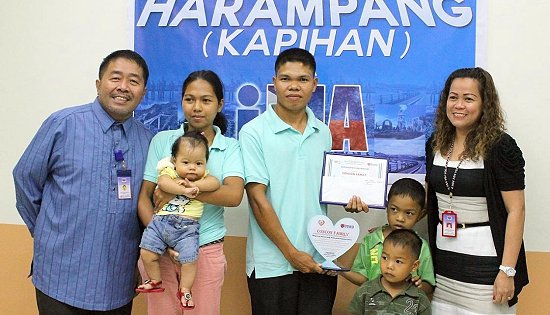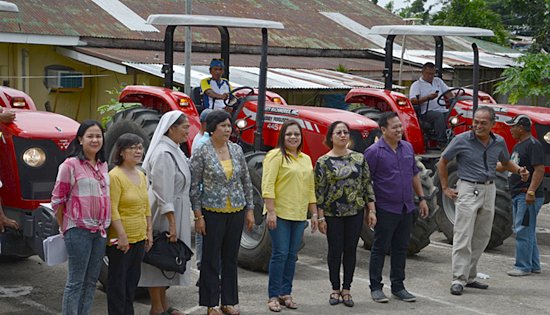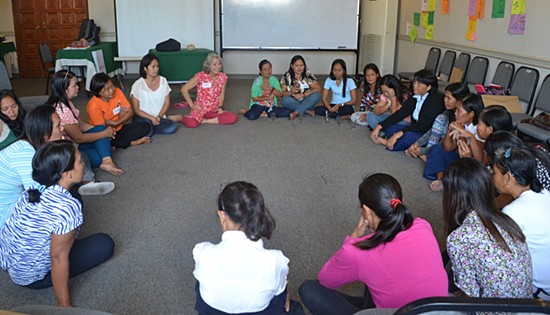|

2014
Huwarang Pantawid Pamilya regional winner Jaime Concon and
family from MacArthur, Leyte pose with DSWD 8 regional assistant
director for operations Resty Macuto (left) and Pantawid Pamilya
regional project coordinator Marichu Bustillos (right) at the
awarding ceremony held at the DSWD conference hall, Tacloban
City, September 16. (Vino R. Cuayzon) |
DSWD-8 awards
winners of 4Ps model family
By JONNIE H. BUENAVENTURA,
PIA-8
September 16, 2014
TACLOBAN CITY – A
reward system was devised by the Department of Social Welfare and
Development for the program beneficiaries of the Pantawid Pamilyang
Pilipino Program (4Ps). The device called Huwarang Pantawid Pamilya,
coursed through the social marketing unit of DSWD, was aimed to
empower the program beneficiaries and show the public the progressive
impact of the program, create model families who embody strong family
ties, demonstrate positive Filipino values and create a positive
influence in the community.
According to Resty Macuto,
Assistant Regional Director for Operations, Regional Office 8, the
search for “Huwarang Pantawid Pamilya” was geared to acknowledge the
good performing family beneficiaries of the Pantawid Pamilyang
Pilipino Program.
Director Macuto emphasized
that the awarding of model families for Pantawid Pamilyang Pilipino
Program beneficiaries was timely considering that Proclamation No. 847
was signed by then President Fidel V. Ramos declaring fourth Sunday of
September as Family Thanksgiving Day.
The search was tedious
considering that the criteria is based on desk validation and field
validation to really determine the rightful winner.
The winning model family was
Mr. Jaime Concon and family of MacArthur, Leyte for the regional
category who received P6,000 cash plus plaque of recognition.
Winners for the provincial
category were: Mrs. Nenita Basal and family of Catbalogan, Samar who
received P5,000 cash plus plaque of recognition; Mrs. Arlene Narita
and family of Naval, Biliran who received P4,000 cash plus plaque of
recognition; Mrs. Minda Ypulong and family of San Roque, Northern
Samar who received P2,500 cash plus certificate of recognition; and
Mrs. Tita Berondo and family of San Juan, Southern Leyte who received
P2,500 cash plus certificate of recognition.
According to regional winner
Jaime Concon, he was hesitant in joining the search considering that
since elementary he did not join any contest but he was nominated by
the group of beneficiaries to represent them.
All winners are parent
leaders for Pantawid Pamiliyang Pilipino Program in their respective
community.
They are anticipating that
the program will continue because it really provides help for the
indigent Filipinos.
|

Regional
Director Sheila Enciso (center) of the Dept. of Agrarian Reform
(DAR) in Region-8 posed with Sister Eloisa David, OSB (third
from left) and other DAR officials in front of the five tractors
that were turned over to recipient agrarian reform beneficiary
organizations (ARBOs) under the Agrarian Reform Communities
Connectivity and Economic Support Services (ARCCESS) project
after the ceremony. (JOSE ALSMITH L. SORIA) |
DAR turns over
P15.5-M machineries
By JOSE ALSMITH L. SORIA
September 16, 2014
TACLOBAN CITY – Some
P15.5 million worth of farm machineries were turned over recently by
the Department of Agrarian Reform (DAR) to five agrarian reform
beneficiary organizations (ARBOs) in Leyte, Samar and Eastern Samar.
The amount, according to
Regional Director Sheila Enciso, is the total cost of the five
tractors given away to ARBOs in severely affected provinces by the
super typhoon “Yolanda”.
Enciso added that the
machines were primarily intended for the clearing and rehabilitation
of farm lots in areas greatly affected by the typhoon.
Based on available data,
Leyte, Eastern Samar and Samar were the hardest hit provinces with
thousands of people reported dead, while millions of pesos worth of
properties were damaged. Thus, three tractors were distributed in
Leyte, while one tractor each for the provinces of Samar and Eastern
Samar.
DAR entrusted to five ARBOs
the operations and maintenance of the machines which cost P3,117,920
per unit.
For Leyte, DAR turned over
the machines to the St. Benedict’s Association for Sustainable Farming
which is based in Tunga, the Boroc Agricultural Primary Multi-Purpose
Cooperative in Ormoc and the Zaragosa Agrarian Cooperative in Matalom;
while for Eastern Samar and Samar, DAR turned over the machines to the
Carapdapan Small Farmers and Fishermen Producers Cooperative based in
Salcedo, Eastern Samar and the Legaspi Farmers and Fishermen
Association in Marabut, Samar, respectively.
These tractors were funded
under the Agrarian Reform Communities Connectivity and Economic
Support Services (ARCCESS) project.
Though these were not among
the recommended common service facilities (CSFs) for the ARCCESS
project, Enciso explained that these were provided by the agency in
addition for the typhoon-affected areas to help out clear the farms
from debris and restore them back to their productive state.
It was also very timely, she
added, because during the agency’s last meeting with representatives
from the Catholic Relief Services (CRS) and the Food and Agriculture
Organization (FAO), who both renewed their commitment to assist in the
rehabilitation of the ARCs, DAR was asked to provide the tractor to
hasten the restoration process.
Groups launch
resistance movement vs. Aquino’s emergency powers, cha-cha, term
extension and attacks vs. Supreme Court
Press Release
September 15, 2014
QUEZON CITY – “When
injustice becomes law, resistance becomes a duty.” Atty Aaron Pedrosa,
SANLAKAS Secretary General borrows a quote from Thomas Jefferson, as
various groups and sectoral organizations gathered to launch a
movement dubbed as “All Resist Movement” (ARM the People!).
Leaders of the Bukluran ng
Manggagawang Pilipino (BMP), SANLAKAS, Kongreso ng Pagkakaisa ng
Maralita sa Lunsod (KPML), Aniban ng Magsasaka sa Agrikultura (AMA),
Pagkakaisa ng Manggagawa sa Transportasyon (PMT) and Partido Lakas ng
Masa took turns in lambasting President Noynoy Aquino’s request for a
Joint Resolution from Congress that would grant him emergency powers
to address a purported energy crisis in 2015.
Leody de Guzman, BMP
President, added, “Two presidents invoked and used Emergency Powers:
Fidel Ramos, when he used it and locked-in the country in IPP
contracts that to this day the Filipino people are paying for in high
electricity rates; and Gloria Arroyo, when she wielded emergency
powers to preserve her fraudulently acquired presidency in the 2004
elections. During both times, emergency powers did not serve the
people’s interest and welfare at all.”
“Why does he need Emergency
Powers? The energy crisis is the result of EPIRA, a law that after
over ten years of existence has proven to have failed in ensuring
power supply and affordable electricity for the people, especially the
masses. If Congress should act to resolve the crisis, it is should not
be to give Noynoy emergency powers but to throw out EPIRA and pass a
new law that gives back the control of the power industry to
government.” decried Flora A. Santos of the Metro Manila Vendors
Alliance.
“Connect the dots. From
appropriating the powers of Congress to stop approved government
projects, declaring these funds as “savings” in order to divert the
funds into other projects, and the cross-border transfer of these
funds to allies and prospective allies, his endorsement of ChaCha for
the expressed purpose of clipping the powers of the Supreme Court, his
innuendos towards term extension, and now, Aquino wants emergency
powers. Doesn’t this smack of Marcosian rule?” Pedrosa pointed out.
The groups also opposed the
Economic ChaCha, spearheaded by House Speaker Sonny Belmonte. Sonny
Melencio, PLM Chairman, described the move to insert the phrase “and
as provided by law” towards allowing 100% foreign ownership in the
Philippines as “an attempt to give foreign corporate interest a free
pass to ravage the nation’s natural and human resources without any
guarantees that it will benefit the entire populace and not only the
factories in export processing zones and the residences of the
propertied classes”.
While Aquino and his allies
give foreign corporate interest carte blanche rights to plunder our
economy, PNoy is going on his 4-European Nation 8-day Tour on a
Filipino labor-pimping mission.”, added Gie Relova of BMP.
“All of the Heads of State
and corporate bosses that Aquino will talk to will find out how dirt
cheap Filipino labor is and how contractualization has breached all
industries in the country and that once the constitution is amended,
it will make it even more profitable for capitalists to invest here”,
Relova said.
The All Resist Movement (ARM
the People) which they described as a peoples’ crusade in response to
Noynoy Aquino’s plans to further plunder the economy and extend his
term in office by amending the constitution and utilizing special
provisions that will grant him emergency powers.
The ARM the People campaign,
as the militants articulated “is also the peoples’ response and
resistance to the crude political maneuvers of Aquino and allies to
secure their political survival in the 2016 elections by the continued
practice of the pork barrel system”.
Pedrosa argued that, “After
the striking down of the impeachment charges before the House, this
call to arms is the logical step forward for an aggrieved and
victimized nation to redress the four-year epic failure of the
presidency of Aquino and the unabated neglect and misery of our
people”.
ARM the People will be
launched this coming week from the 16th onward with a series of mass
actions to bring to Noynoy’s doorstep in Malacanang, to Congress, to
the Senate the resistance of a people who will not allow corruption,
injustice or tyranny to prevail.
On September 21, ARM the
People will hold simultaneous protest actions at the grassroots level
in various cities and municipalities in Metro Manila, and in major
city centers in Laguna, Cavite, Bulacan, Cebu, Iloilo, Bacolod,
Tacloban, Davao City and Ozamiz City.
NPA in Leyte losses
high-powered firearms to 8ID troops
By DPAO, 8ID PA
September 14, 2014
CAMP LUKBAN, Catbalogan City –
Army troops operating in Leyte Province encountered NPA members in a
remote area of Barangay Parag-um, Carigara, Leyte early in the morning
of September 14, 2014.
Based on the initial report
by Lt Col Nedy C Espulgar, Commanding Officer, 19th Infantry Battalion
based at Brgy Aguiting, Kananga, Leyte, his troops received
information from a concerned citizen regarding the presence of NPA
members in the aforesaid barangay who were conducting extortion
activities to the local residents.
Immediately, Lt Col Espulgar
dispatched a squad from Charlie Company to confirm the veracity of the
report. However, while approaching said barangay, the government
troops were fired upon by undetermined number of NPA members prompting
the troops to fire back. A thirty minute firefight ensued after which
the rebels immediately withdrew towards different directions.
The encounter resulted to
the recovery from the NPA of two M16 armalite rifles, one M16 rifle
with grenade launcher, ammunition and personal belongings. There was
no reported casualty on the side of the government troops while
undetermined on the enemy side.
Maj. Gen. Jet B. Velarmino,
Commander of the 8th Infantry Division lauded the officers and men of
19IB for the successful encounter against the NPAs operating in
Carigara, Leyte. The 8ID chief further extended his appreciation to
the peace-loving residents of Brgy. Parag-um for reporting the NPA
presence in their community.
“I would like to express my
sincerest appreciation for the continued support of the communities in
our quest for a lasting peace here in the Municipality of Carigara,
Leyte. Small as it maybe, your timely information significantly led to
the success of our effort in addressing the NPA threat in this part of
the region. Rest assured that your Army here in Eastern Visayas will
remain and will always be by your side as we pursue genuine peace,
nation-building and development in this region”, says MGen. Velarmino.
To decongest NCR, spur dev’t
in regions
Cayetano: Move some
government agencies outside Metro Manila
By Office of the Senate
Majority Leader
September 14, 2014
PASAY CITY – Senate
Majority Leader Alan Peter “Companero” S. Cayetano is pushing for the
relocation of some government departments outside Metro Manila not
only to decongest cities in the capital region but more importantly,
to boost economic development in the countryside.
“If we want a long-term
solution to decongest Metro Manila, the government must bring growth
to the countryside. Kapag nag-economic planning tayo, dapat may
national vision and coherent policy but there should also be 17
regional strategies. Bawat region, may strategy tapos paglalaanan ng
pondo,” Cayetano said.
“There are 19,137 Filipinos
per square kilometer in Metro Manila, ganoon kadami ang tao dito. Ang
pinakamalapit nang bilang ay sa Calabarzon, which only has 758 people
per square meter. The rest, ang average is around 300 per square
meter. Karamihan nasa Metro Manila na,” he noted.
Cayetano proposed that the
Departments of Agriculture, and Agrarian Reform be transferred to
Central Luzon, the country's rice granary, while the Department of
Transportation and Communications be moved to Cavite where the agency
is eyeing to build a new airport, and the Department of Tourism to
tourist haven Cebu in Central Visayas.
He is also suggesting that
the National Anti-Poverty Commission be relocated in Mindanao, which
has some of the poorest provinces and municipalities in the entire
country.
“Metro Manila will continue
to be the political and financial capital of the Philippines but this
should not mean economic activity should be concentrated in the
capital region,” Cayetano said.
The senator is also pushing
for similar health centers located in Metro Manila to be constructed
in other regions across the country to provide wider access to health
facilities and services, and promote employment among medical
professionals.
“Ang Lung Center natin,
Kidney Center, Orthopedic Center lahat nasa Metro Manila. Kapag
Ilocano ka, Zamboangeno, or Cebuano, pupunta ka pa sa Manila for that?
Why can’t we build a Philippine Heart Center in Visayas or in
Mindanao? So that ang mga doctors, may choice din na doon pumunta, and
economic activity will grow,” Cayetano said.
|

HEALING
CLASSROOMS. In partnership with International Rescue Committee
(IRC), the Ramon Aboitiz Foundation Inc. Dolores Aboitiz
Children's Fund (RAFI-DACF) augmented its day care construction
project with IRC's "Healing Classrooms" program, wherein
teachers are trained to help children recover from crisis. |
IRC trains RAFI on
disaster, emergency response mgt.
By CELINE AMPARO,
RAFI Comm.
Intern
September 12, 2014
CEBU CITY – Aside
from donating to the relief and rehabilitation efforts of the Ramon
Aboitiz Foundation Inc. (RAFI), worldwide humanitarian organization
International Rescue Committee (IRC) has also started training RAFI in
terms of emergency and disaster response management.
The capacity building
training focuses on emergency competencies, economic recovery
programs, and team and stress management skills. Participants of the
training program include those directly involved in the Super Typhoon
Yolanda relief efforts.
Last February, IRC also gave
RAFI training on assessment and introductory module on emergency and
disaster response and resilience.
IRC, an organization formed
at the behest of scientist Albert Einstein, and RAFI held their
organizational development consultation last July 25 as part of the
program on capacity building and development of emergency and disaster
response procedures.
Evelyn Nacario-Castro,
Executive Director of the RAFI Eduardo Aboitiz Development Studies
Center, said IRC is very supportive of what RAFI wants to do.
“We see our partnership with
RAFI as a way to know how disaster response works in the Philippines,
in the same way we hope we can bring somebody around to be brave about
emergencies,” IRC Emergency Preparedness Coordinator Christine Amy
said.
IRC also partnered with the
RAFI-Dolores Aboitiz Children’s Fund (DACF) in the building of 20
disaster-resilient day care centers in the towns of Daanbantayan,
Bantayan, Madridejos, and Santa Fe, Cebu.
Of the 20 day care centers,
12 have been rehabilitated in Barangays Tinubdan, Dalingding, Pajo,
and Bitoon in Daanbantayan; Barangays Oboob, Baigad, and Okoy in
Bantayan; Barangays Poblacion, Kangyawan, and Kaongkod in Madridejos;
and Barangays Poblacion and Maricaban in Santa Fe.
The remaining eight are
newly-constructed day care centers in Barangays Bateria, Malbago,
Lanao, and Tapilon in Daanbantayan; Barangays Kampingganon and Sillon
in Bantayan; and Barangays Balidbid and Okoy in Santa Fe.
“The components of this day
care center (program) are the ‘Healing Classrooms’ where skilled day
care workers would work to identify trauma in children who experienced
difficult traumatic experiences due to a disaster and help them
develop their well-being,” IRC Emergency Field Director Suzanna Tkalec
said.
The Healing Classrooms
program is an original IRC concept designed to train day care workers
and teachers in using special techniques that would aid them in
engaging traumatized children from devastated areas, and create a
secure and nurturing learning environment for them.
IRC started the program in
2004, working with more than 5,000 teachers and 400,000 students each
year in countries like Afghanistan and Pakistan. IRC said families in
these devastated lands lost loved ones, homes, and jobs, and the
children often lacked the coping skills they need to move forward with
their lives.
"Since we want a holistic
recovery for the Yolanda survivors, we do not only train the day care
workers to help children cope, but we also teach them (day care
workers) to heal themselves because they were also devastated by the
typhoon," DACF Program Officer Jan Montilla said.
Together with IRC, DACF
trained 22 day care workers from 20 sitios and barangays in the four
towns.
IRC Consultant Trainer
Patricia Giffoni and DACF facilitated a training series for the day
care workers. The first training in July focused on methodologies and
techniques that can be used in teaching children inside the “healing
classrooms,” such as establishing routines on daily activities, and
cold calling during recitals or discussions.
The next training in August
focused on the assessment of children, wherein the day care workers
were trained how to craft participatory activities, such as games and
group works, appropriate for a child's age and stage of development.
Aside from ensuring the
children’s recovery, these activities are also aimed to develop the
seven domains of child development: gross and fine motor skills;
expressive, receptive and cognitive languages; and self-help and
spiritual development.